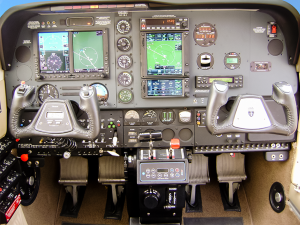


However, most Bonanza features were available as factory options on the Debonair, and by the mid 1960s, most Debonair buyers were ordering most or all of these options. The Model 33 Debonair was introduced in 1960 as a lower-priced model with more austere standard instrumentation, exterior equipment, paint schemes, and interior fabrics and trim than the more prestigious V-tail Bonanza. Model 36 Bonanza (1968–present a stretched Model 33).Model 33 Debonair or Bonanza (1960–1995 conventional tail).Three major variants eventually comprised the Bonanza family:

The first 30–40 Bonanzas produced had fabric-covered flaps and ailerons, after which those surfaces were covered with magnesium alloy sheet. The prototype 35 Bonanza made its first flight on December 22, 1945, with the type receiving an airworthiness certificate on March 25, 1947. The Model 35 featured retractable landing gear, and its signature V-tail (equipped with combination elevator-rudders called "ruddervators"). With its high-wing, seven-cylinder radial engine, fixed tailwheel undercarriage, and roll-down side windows, the Cessna 195 was little more than a continuation of prewar technology the 35 Bonanza, however, was more like the fighters developed during the war, featuring an easier-to-manage, horizontally opposed, six-cylinder engine, a rakishly streamlined shape, retractable tricycle undercarriage (although the nosewheel initially was not steerable, but castering) and low-wing configuration.ĭesigned by a team led by Ralph Harmon, the model 35 Bonanza was a relatively fast, low-wing monoplane at a time when most light aircraft were still made of wood and fabric. A 1947 advertisement for the first Model 35 BonanzaĪt the end of World War II, two all-metal light aircraft emerged, the Model 35 Bonanza and the Cessna 195, that represented very different approaches to the premium end of the postwar civil-aviation market.


 0 kommentar(er)
0 kommentar(er)
